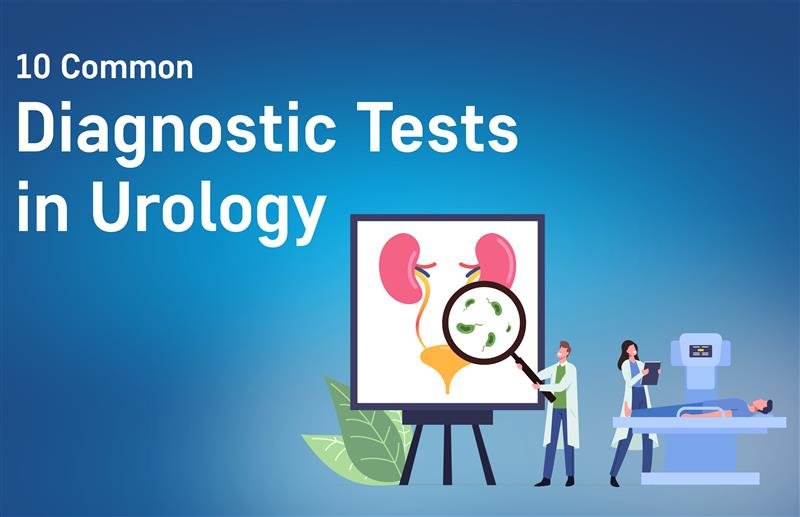
When it comes to understanding urological health, diagnostic tests are essential. Problems with the urinary system can range from kidney stones and UTIs to other complications like prostate cancer. That way, it can save the confusion on what is available and what is involved in the diagnostic process to make it smoother a step a patient can take to his or her healthcare. Finally, let us discuss the ten most frequently used diagnosing tests in urology and what a patient and the Best Urologist in Ahmedabad can do to favor his recovery and continue with the treatment.
Table of Contents
10. Diagnostic Test
1. Urinalysis
Perhaps the most common and one of the simplest tests in urology is a urinalysis. The result of this test might find several physical chemical or microscopic pathologies in urine that may include blood, and proteins in urine to identify kidney disease or UTI infections in the bladder, etc. In essence, a urine test is usually the first thing anyone who complains of flaming when he/she passes urine, a tendency to pass urine more often, or even if he/she produces foul-smelling, frothy, bloody, or cloudy urine has to undergo.
2. Urine Culture
A urine culture is slightly different from a urinalysis because it focuses on a particular bacteria that is the cause of a urinary tract infection. It is very important because knowing which exact bacteria you have the best urologist in Ahmedabad, gives a specific antibiotic that the bacteria is not resistant to thereby facilitating full recovery.
3. Ultrasound
Specifically, ultrasound imaging, or sonography, is commonly applied in urology for viewing the kidneys, bladder, and prostate. The test is not invasive and it doesn’t feel bad, it helps to determine whether the kidney stones, tumors, cysts, or blockages. Ultrasound is continuously monitored because there is no radiation.
4. Uroflowmetry
This test will indicate just how soon you are capable of letting go of urine and can be used to diagnose diseases that affect how urine moves, including benign prostatic hyperplasia (BPH or enlarged prostate) or urethral strictures. Uroflowmetry provides considerable information concerning the performance of the urinary system which the best urologist in Ahmedabad can evaluate and make a sound strategy. ents who need continuous monitoring because it doesn’t use radiation.
5. Cystoscopy
A cystoscopy is performed when a thin length with a camber is inserted through the urethra into the bladder to have a look at the situation inside the bladder and urethra. This method can be used for the diagnosis of bladder stones, tumors, or blockages. The D-Mannose absorptiometry test may be performed in patients who have unexplained hematuria, dysuria, or recurrent UTIs. It’s not so bad when balanced, but lowers a bit, it does give some great insights that no exterior imaging test can, and knowing us, who knows what exact quirks she had?
6. CT Scan and MRI
If you have a complicated condition, you may need a CT scan and or MRI. Some of these imaging techniques are relatively effective in diagnosing kidney stones, tumors, and structural anomalies. For the detection of stones, however, CT Scans are generally preferred over MRI as it gives a clearer picture through a better modality for soft tissue imaging. With the best urologist doctor in Ahmedabad, these scans can save your life as they may be life-saving to detect cancer or abnormalities that would not be detected with other tests.
7. Prostate-Specific Antigen (PSA) Test
PSA test is a blood test where the amount of PSA in the blood is determined and very useful for men after 50. Other causes include increased PSA levels which may be caused by an enlarged prostate, inflammation of the prostate, or even prostate cancer. This in itself is not conclusive, but it is another useful guideline for keeping tabs on prostate health, particularly for those patients who are considered at risk.
8. Urodynamic Testing
Urodynamic tests identify the capacity of the bladder, the function of the urethra, and the sphincter muscle in retaining and expelling urine. Particularly beneficial are these tests if the patient possesses incontinence, gets recurrent UTI, or suffers from neurogenic bladder. The best urology Doctor in Ahmedabad urodynamic tests can be done to see how your bladder works and may prescribe medication and physical therapy among other treatments.
9. Intravenous Pyelogram (IVP)
An IVP is an X-ray test in which dye is inserted into your bloodstream after which a picture of your urinary system is taken. This test is useful in diagnosing different diseases, including cancerous cells within the kidneys, ureters, or bladder, and the formation of stones. CT scans and pyelography are among the most used tests to determine the causes of pain or blood in the urine as well as the overall structure of the urinary tract.
10. Biopsy
A biopsy may be required where there is an unusual growth or a lump to check whether or not it is cancerous. A biopsy is a partial removal of tissue for examination of the body. In particular, this test is widely used in the diagnosis of prostate and bladder malignant neoplasms. If they are in doubt about what may have led to the formation of the lesion, a biopsy is normally conducted under local anesthesia, and the results are uncontestable though they assist the best urologist surgeon in Ahmedabad to provide a detailed treatment plan if required.
The Role of Early Management in Urological Disorders
This is important in urology since the stage of diagnosis will determine the type of treatment to be taken and the prognosis. Most urological diseases like kidney stones or urinary tract infections are mild when treated early. However, for sensitive conditions such as prostate or bladder cancer, the earlier the condition is diagnosed the better. The top urologist surgeon in Ahmedabad has experience with taking patients through diagnostic procedures and explaining what each test entails.
When to See a Urologist?
You should consider visiting the best urologist in Ahmedabad if you experience any of the following symptoms:
- Blood in the urine
- Upper abdominal pain that doesn’t go away together with lower back or side pain
- Pain and/or more often emptying of the bladder
- Impotence or poor urinary tract control
It also hurts if not treated because the underlying causes of these symptoms could become complicated when not diagnosed and treated by a qualified urologist.
How to Choose the Best Urologist?
Several things to consider when choosing the Best Urology Doctor in Ahmedabad – the qualification of the specialist, patients’ feedback, and a more liberal approach during the treatment of the ailment. A leading urological oncologist like Dr. Dushyant Pawar thus empowers the patient as much as possible and makes him or her as relaxed as possible during the various stages of treatment.
Steps to Take the First Step Toward Improved Urological Health
In case you experience any of the above signs, or require a simple urological check-up you can contact one of the reputable urologists in Ahmedabad, Dr. Dushyant Pawar. Thanks to this technique and Dr. Pawar’s deep interest in patients’ stories, the patients can regain their confidence and physical health, as well as receive a suitable treatment and explanation of the results of examination from the specialist.
Schedule an appointment with Dr. Dushyant Pawar today to start your journey toward optimal urological health!





